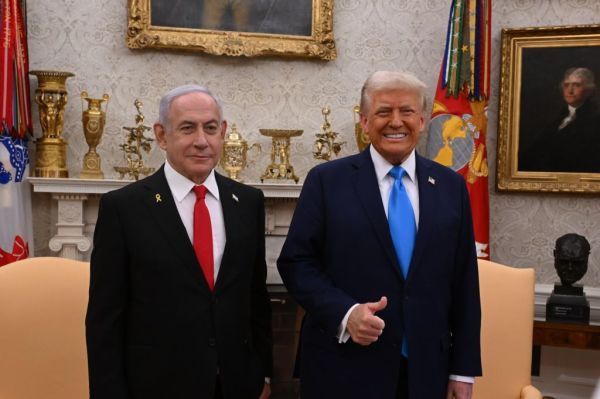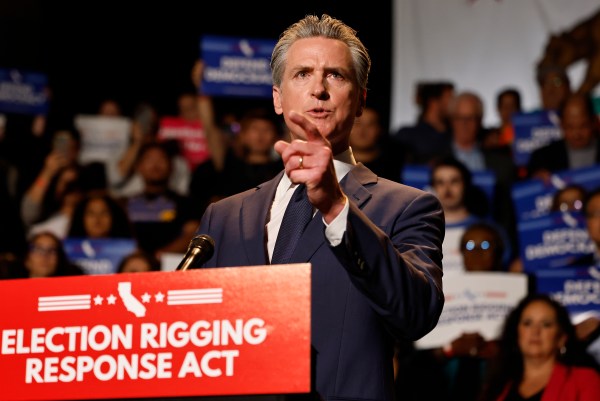Happy Thursday! It looks like someone else got wind of the new Waffle House egg surcharge we mentioned in yesterday’s newsletter, committing Grand Theft Egg of $40,000 worth of eggs in Greencastle, Pennsylvania. Could this be the beginning of a new, thriving black market?
Quick Hits: Today’s Top Stories
- Every employee at the Central Intelligence Agency was offered a buyout on Tuesday, making it the first intelligence agency to be targeted in President Donald Trump’s effort to reshape the federal bureaucracy. Under the arrangement, employees who leave voluntarily would be eligible for eight months of pay and benefits. Sources told CNN that CIA Director John Ratcliffe decided to implement the buyout program in his agency as a way to realign it with Trump’s priorities, such as focusing on intelligence operations in South America. On Wednesday, the New York Times first reported that the White House had ordered the CIA to send an unclassified email that included the names of new employees—a move one former intelligence officials said could risk exposing the identities of agents.
- A federal district court judge in Maryland issued a nationwide preliminary injunction on Wednesday to block Trump’s executive order attempting to eliminate birthright citizenship. “The executive order conflicts with the plain language of the 14th Amendment, contradicts 125-year-old binding Supreme Court precedent and runs counter to our nation’s 250-year history of citizenship by birth,” wrote Judge Deborah L. Boardman, an appointee of former President Joe Biden. Last month, a federal judge in Seattle issued a 14-day temporary restraining order against the executive order, but a preliminary injunction will hold until the case is resolved, likely in a higher court.
- A Tuesday email and online notice from the Trump administration notified employees of the U.S. Agency for International Development (USAID) that almost all agency workers would be placed on administrative leave, starting Friday at noon, and that all overseas employees would likely be recalled. “Essential personnel expected to continue working will be informed by Agency leadership by Thursday, February 6, at 3:00pm (EST),” a notice posted to USAID’s website said. Democrats and federal employee groups have vowed to oppose the effort, which they say amounts to the unlawful shuttering of an agency codified by statute.
- Trump on Wednesday signed an executive order aimed at preventing transgender women athletes from participating in women’s sports. Titled “Keeping Men out of Women’s Sports,” the order directs federal agencies to “take all appropriate action to affirmatively protect all-female athletic opportunities and all-female locker rooms and thereby provide the equal opportunity guaranteed by Title IX,” including by pulling federal funding from schools who allow transgender athletes who were born male to compete in women’s sports. The order seeks to further reverse a Biden administration initiative to broaden Title IX to include protections for transgender athletes in schools.
- The Bureau of Economic Analysis announced Wednesday the U.S. trade deficit—the gap between the value of U.S. imports and exports—expanded to $98.4 billion in December, up from $78.2 billion in November. Imports were up 3.5 percent month-over-month to an all-time high of $364.9 billion amid the threat of tariffs, while exports fell 2.6 percent month-over-month to $266.5 billion.
- The Aga Khan IV, a billionaire philanthropist and religious leader of the 15-million-strong Ismaili Muslim sect, died Wednesday at the age of 88. Also known as Prince Karim al-Husseini, Aga Khan was the 49th iman of the Ismailis, a branch of Shia Muslims whose beliefs differ from mainstream Shi’ism on the nature and identity of the iman—the spiritual leader of the Islamic world.
‘Make Gaza Beautiful Again’

TEL AVIV, Israel—From Greenland to Gaza, President Donald Trump is making a habit of flouting conventional diplomatic wisdom.
During a joint press conference with Israeli Prime Minister Benjamin Netanyahu on Tuesday, Trump’s remarks proceeded along a familiar route, oscillating between praise of his first administration’s Middle East record and attacks on Joe Biden’s administration. That is, until the midway mark. In a departure from his campaign promise to limit American military engagements, Trump claimed that the U.S. would “take over” the war-torn Gaza Strip—by force if necessary. “We’ll own it, and be responsible for dismantling all of the dangerous unexploded bombs and other weapons on the site,” he said. “Level the site and get rid of the destroyed buildings.”
“The only reason the Palestinians want to go back to Gaza is they have no alternative,” Trump added. Describing the Palestinian territory as “a symbol of death and destruction for so many decades,” the president indicated plans to relocate its population of some 2 million so they could “live out their lives in peace and harmony instead of having to go back and do it again.” Press secretary Karoline Leavitt later said that Trump was only advocating for the temporary removal of Gazans while reconstruction took place.
Still, the president’s ostentatious proposal set off chatter from politicians and pundits the world over: Was it an earnest plan for a U.S. military takeover or a calculated opening bid, as the president seeks to reshape the Middle East in his image? Or perhaps Trump’s ambitious real estate venture yet, to transform the embattled enclave into a “Middle East Riviera”?
As with Trump’s other expansionist gambits since retaking office, the pitch was light on details and heavy on promises. But it could still have far-reaching consequences for the Gaza Strip, particularly as a fragile U.S.-brokered ceasefire and hostage release deal holds despite concerns about Hamas’ continued governance.
Trump administration officials quickly rallied around Trump’s unconventional plan for Gaza. “Gaza MUST BE FREE from Hamas,” Secretary of State Marco Rubio wrote on X Tuesday night. “As [Trump] shared today, the United States stands ready to lead and Make Gaza Beautiful Again. Our pursuit is one of lasting peace in the region for all people.” Defense Secretary Pete Hegseth likewise praised Trump’s “outside the box” thinking. “The definition of insanity is attempting to do the same thing over and over and over again,” he said, adding that “all options” are on the table when it comes to implementing the president’s vision.
And they’d need to be. Relocating millions of people would be a massive logistical undertaking, complicated further by the fact that no countries in the region have agreed to absorb large numbers of Palestinian refugees. During his press conference Tuesday, Trump reiterated his desire for Jordan and Egypt to accept Gazans—a proposal that the two countries have rejected multiple times, fearing the displaced populations would never be permitted to return.
Such would be the dream of the Israeli far-right realized. Itamar Ben-Gvir, leader of the right-wing Otzma Yehudit party, praised Trump’s idea and said he would return to Netanyahu’s government—from which he withdrew last month over the U.S.-brokered ceasefire deal—if it comes to fruition. “We have a huge opportunity and we must not miss it. Even before October 7, I encouraged emigration and they mocked me,” he said Wednesday. “We must embrace it and not just make a statement. It is time to implement and promote it.”
Ben-Gvir’s response was far from emblematic of how Israelis are thinking about Gaza’s postwar governance. Some, including family members of Israeli abductees, warned that Trump’s extreme rhetoric could endanger the ceasefire agreement and, by extension, the hostages still held in Gaza. Others worried it would further politicize U.S. support for Israel in the eyes of many Americans, pushing a once-bipartisan issue firmly into the Republican camp.
But some Israelis celebrated Trump’s words not for the literal plan itself but for what it stands for: a break in the status quo of how to handle a deadly and cyclical conflict. For decades, upticks in violence have been followed by reinvigorated Western and regional efforts to push both sides toward a two-state solution. The problem—as Hamas demonstrated through its October 7 attack on the peaceniks of southern Israel—is that many leading Palestinian factions still reject the Jewish state’s right to exist within any borders.
In Gaza in particular, rounds of lethal fighting have long ended in costly international rebuilding and recovery efforts, as Hamas—which solidifies its sovereignty over the Strip by distributing international aid—stockpiles weapons and builds tunnels under civilian infrastructure in preparation for its next attack on Israel. The cycle is as catastrophic for the Palestinians living under a repressive terrorist regime as it is for Israelis nearby—as the war winds down, Hamas has reportedly begun the extrajudicial executions of alleged “collaborators” in Gaza.
Last week, we wrote to you about the difficulties of reaching an enduring peace while Hamas remains the dominant force in the Gaza Strip:
A formal ceasefire agreement that provides legitimacy to the Islamist terrorist organization and cements it as the undisputed power center in the Gaza Strip would be a major strategic victory for Israel’s enemies. The new Trump administration maintains that such an outcome would be unacceptable.
…
According to [Foundation for the Defense of Democracies analyst Jonathan] Schanzer, two fundamental questions must be answered before any effort to rebuild Gaza begins: “One: Are there patrons?” and “Two: How can such an undertaking occur while Hamas is still in power?”
Through that lens, the threatened deployment of American troops can be understood as an effort to force Middle Eastern countries to the table as the U.S. and Israel seek to craft a vision for postwar Gaza that excludes Hamas. The Gulf states—including the United Arab Emirates (UAE) and Saudi Arabia—have been thus far reluctant to involve themselves in a “day after” plan for the Strip for fear of being seen by their own populations as aligned with Israel’s war effort, but the Trump administration may try to force their hand.
“Nobody has a realistic solution,” National Security Adviser Mike Waltz told CBS News on Wednesday. “It’s going to bring the entire region to come up with their own solutions if they don’t like Mr. Trump’s solution.”
Worth Your Time
- On his Marginal Revolution blog, economist and polymath Tyler Cowen took an outside-the-box look at Trump’s recent flurry of executive orders, arguing that they are less about policy and more an attempt to change American culture from the top-down. “I think of Trumpian policy, first and foremost, as elevating cultural policy above all else,” he wrote. “Imagine you hold a vision where the (partial) decline of America largely is about culture. After all, we have more people and more natural resources than ever before. Our top achievements remain impressive. But is the overall culture of the people in such great shape? The culture of government and public service? Interest in our religious organizations? The quality of local government in many states? You don’t have to be a diehard Trumper to have some serious reservations on such questions … .So imagine you started a political revolution and asked the simple question ‘does this policy change reinforce or overturn our basic cultural messages?’ Every time the policy or policy debate pushes culture in what you think is the right direction, just do it. Do it in the view that the cultural factors will, over some time horizon, surpass everything else in import.”
- The Economist reported on the massive cleanup effort now underway in the wake of the Los Angeles fires, and how the effort is already running into California’s infamous mountain of red tape: “The need for workers and speedy permits (not something California does well) will be enormous. The county wants to create a fast process for those who want to rebuild exactly what they lost and a slower lane for everyone else. Local officials also plan to ask the state to allow them to ignore recently-passed laws to increase housing density, arguing that they will just slow down rebuilding. YIMBYs say these moves would prioritise rebuilding single-family homes in fire-prone areas. ‘There’s political pressure to be seen as doing something,’ says Chris Elmendorf of the University of California, Davis. Fire victims deserve haste and help. ‘But I don’t see the legislature just saying, “OK, you don’t have to comply with any state housing law”.’”
Presented Without Comment
New York Times: F.C.C. Releases ‘60 Minutes’ Interview With Kamala Harris
The Federal Communications Commission on Wednesday released the transcript of a “60 Minutes” interview with Vice President Kamala Harris that has been at the center of a lawsuit between CBS and President Trump.
The transcript of the interview shows that Ms. Harris gave a lengthy answer to a question about Benjamin Netanyahu, Israel’s prime minister. About 21 seconds of that answer was aired in a preview of the interview on “Face the Nation.” A different seven-second part of the answer aired the next day in an episode of “60 Minutes.”
Also Presented Without Comment
The Hill: [Ukrainian President Volodymyr] Zelensky Accuses Tucker Carlson of ‘Working for Putin’
Also Also Presented Without Comment
CNN: Google Erases Promise Not to Use AI Technology for Weapons or Surveillance
Google’s updated, public AI ethics policy removes its promise that it won’t use the technology to pursue applications for weapons and surveillance.
In a previous version of the principles seen by CNN on the internet archive Wayback Machine, the company included applications it won’t pursue. One such category was weapons or other technology intended to injure people. Another was technology used to surveil beyond international norms.
That language is gone on the updated principles page.
In the Zeitgeist
Maybe it’s because the cultural “vibes” are less politically correct now that Trump is president, but McDonald’s Hibernian mascot from the 1970s, Uncle O’Grimacey, is back to sell Shamrock Shakes!
Toeing the Company Line
- Attention Dispatch Premium members: We’re hosting our Dispatch Premium Town Hall with Steve Hayes and Jonah Goldberg tonight at 8 p.m. ET, where members can interact directly with our co-founders in a Zoom discussion on the first few weeks of the Trump administration. How are the confirmation hearings going for Donald Trump’s nominees? What is in all of those executive orders? How has Washington, D.C., changed since Trump’s inauguration? And most importantly, how does all of this affect your life? If you’d like to attend this special live town hall, be sure to join Dispatch Premium before tonight’s event!
- In the newsletters: Scott Lincicome examined (🔒) the costs of Trump’s not-quite trade war, Nick Cataggio discussed (🔒) Trump’s plans for Gaza, and Jonah Goldberg tried to (🔒) make sense of the ideology behind the president’s foreign policy decisions.
- On the podcasts: Francis Fukuyama returns to The Remnant to discuss the current state of liberalism with Jonah, and Sarah Isgur and David French talk God and guns on Advisory Opinions.
- On the site: Charles Hilu covers the latest budget reconciliation drama and John McCormack profiles Darren Beattie, Trump’s controversial new State Department appointee. Plus, in our first edition of a new Dispatch Debates series, Andy Smarick argues that Robert F. Kennedy Jr. and Tulsi Gabbard have no place in the conservative movement, while Daniel McCarthy defends the right’s expanding sense of self.
Let Us Know
Is there any reason to take Trump at his word when he threatens to “take over” Gaza?












Please note that we at The Dispatch hold ourselves, our work, and our commenters to a higher standard than other places on the internet. We welcome comments that foster genuine debate or discussion—including comments critical of us or our work—but responses that include ad hominem attacks on fellow Dispatch members or are intended to stoke fear and anger may be moderated.
With your membership, you only have the ability to comment on The Morning Dispatch articles. Consider upgrading to join the conversation everywhere.